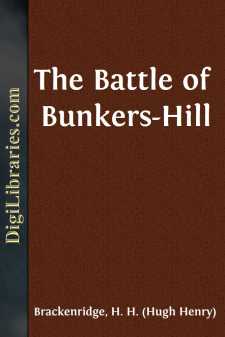Categories
- Antiques & Collectibles 13
- Architecture 36
- Art 48
- Bibles 22
- Biography & Autobiography 813
- Body, Mind & Spirit 142
- Business & Economics 28
- Children's Books 17
- Children's Fiction 14
- Computers 4
- Cooking 94
- Crafts & Hobbies 4
- Drama 346
- Education 46
- Family & Relationships 57
- Fiction 11829
- Games 19
- Gardening 17
- Health & Fitness 34
- History 1377
- House & Home 1
- Humor 147
- Juvenile Fiction 1873
- Juvenile Nonfiction 202
- Language Arts & Disciplines 88
- Law 16
- Literary Collections 686
- Literary Criticism 179
- Mathematics 13
- Medical 41
- Music 40
- Nature 179
- Non-Classifiable 1768
- Performing Arts 7
- Periodicals 1453
- Philosophy 64
- Photography 2
- Poetry 896
- Political Science 203
- Psychology 42
- Reference 154
- Religion 513
- Science 126
- Self-Help 84
- Social Science 81
- Sports & Recreation 34
- Study Aids 3
- Technology & Engineering 59
- Transportation 23
- Travel 463
- True Crime 29
The Battle of Bunkers-Hill
Categories:
Description:
Excerpt
HUGH HENRY BRACKENRIDGE
(1748-1816)
The battle of Bunker's Hill was an event which stirred whatever dramatic activity there was in America at the time of the Revolution. Therefore, a play written on the subject should not be omitted from a collection supposed to be representative of the different periods in American history and in American thought. The reader has an interesting comparison to make in Hugh Henry Brackenridge's play, which the title-page declares is "A dramatic piece of five acts, in heroic measure, by a gentleman of Maryland," and a later piece entitled "Bunker Hill, or the Death of General Warren," written by John Daly Burk (1776-1808), who came to America because of certain political disturbances, and published his drama with a Dedication to Aaron Burr (1797), the year it was given in New York for the first time. It will be found that the former play is conceived in a better spirit, and is more significant because of the fact that it was written so soon after the actual event.
It is natural that Hugh Henry Brackenridge should have been inspired by the Revolution, and should have been prompted by the loyal spirit of the patriots of the time. For he was the stuff from which patriots are made, having, in his early life, been reared in Pennsylvania, even though he first saw the light near Campbletown, Scotland, in 1748. His father (who moved to America in 1753) was a poor farmer, and Hugh received his schooling under precarious conditions, as many boys of that time did. We are given pictures of him, trudging thirty miles in all kinds of weather, in order to borrow books and newspapers, and we are told that, being quick in the learning of languages, he made arrangements with a man, who knew mathematics, to trade accomplishments in order that he himself might become better skilled in the science of calculation.
At the age of fifteen, he was so well equipped that he was engaged to teach school in Maryland, at Gunpowder Falls, some of his pupils being so much larger and older than he that, at one time, he had to take a brand from the fire, and strike one of them, in order to gain ascendency over him.
At eighteen, pocketing whatever money he had saved, he went to President Witherspoon, of the College of New Jersey, arranging with that divine to teach classes in order that he might afford to remain and study. While there, among his classmates may be counted James Madison, future president of the United States, Philip Freneau, the poet, and others of later note. Aaron Burr was a Junior at the time of Brackenridge's graduation, as was William Bradford. Though he was on intimate terms with Madison, he was much more the friend of Freneau, the two writing together "The Rising Glory of America." Should one take the complete piece, which was read by Brackenridge at Commencement, and mark therein that part of the poem composed by Freneau, and included later in Freneau's published works, one might very readily understand that Brackenridge was less the poet, even though in some ways he may have been more versatile as a writer.
This piece, "The Rising Glory of America," is representative of a type of drama which was fostered and encouraged by the colleges of the time. We find Francis Hopkinson, in the College of Philadelphia, writing various dialogues, like his "Exercise: Containing a Dialogue [by the Rev. Dr. Smith] and Ode, sacred to the memory of his late gracious Majesty George II. Performed at the public commencement in the College of Philadelphia, May, 1761." Yet Hopkinson was one of the Signers of the Declaration of Independence!
What says Abbé Robin, viewing Harvard in 1781:
Their pupils often act tragedies, the subject of which is generally taken from their national events, such as the battle of Bunker's Hill, the burning of Charlestown, the death of General Montgomery, the capture of Burgoyne, the treason of Arnold, and the Fall of British Tyranny....


